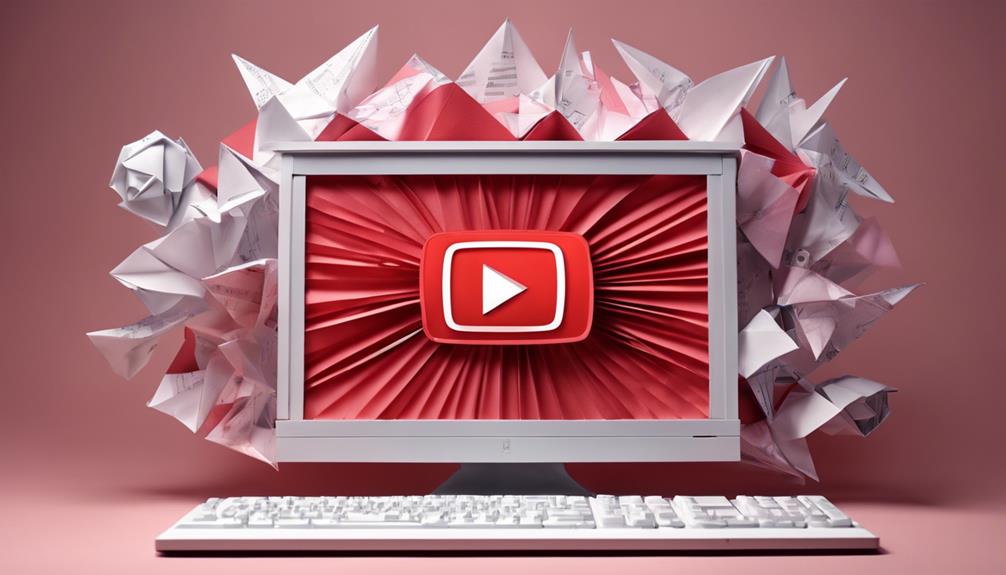YouTube has introduced innovative features and revised copyright policies to enhance user engagement and protect intellectual property. The platform's new functionalities include advanced search algorithms, real-time audience interaction through live polls and Q&A sessions, and improved subtitle and translation options. Concerning copyright, YouTube has upgraded its Content ID system for precise detection, streamlined the dispute resolution process, and expanded educational resources for creators. These changes aim to balance content creation freedom with stringent intellectual property protections. The updated policies might affect monetization timelines and require creators to identify copyrighted content in their videos. Learn about the implications and benefits of these updates.
Key Takeaways
- YouTube introduces advanced search algorithms for enhanced content discovery.
- New real-time engagement tools include live polls and Q&A sessions.
- Improved subtitle and translation features aim to reach a global audience.
- Enhanced Content ID System ensures accurate detection of copyrighted material.
- Simplified dispute resolution process focuses on mediation for creators.
New YouTube Features

In its ongoing effort to enhance user experience, YouTube has introduced several innovative features designed to improve content accessibility and engagement. Among these advancements is the introduction of enhanced search capabilities, which utilize advanced algorithms to deliver more accurate and personalized search results.
Additionally, YouTube has rolled out new interactive tools for creators, allowing for real-time audience engagement through live polls and Q&A sessions. Another notable feature is the improved subtitle and translation options, facilitating better comprehension for a global audience.
'Our goal is to make content more accessible and engaging for all users,' stated a YouTube spokesperson. These updates reflect YouTube's commitment to leveraging technology to create a more inclusive and interactive platform for both creators and viewers.
Updated Copyright Policies

YouTube's updated copyright policies aim to provide clearer guidelines and stronger protections for both creators and rights holders. These changes streamline the process of identifying and addressing copyright infringements, ensuring a more transparent and efficient resolution.
Key elements of the new policies include:
- Enhanced Content ID System: Improvements to YouTube's automated system for detecting copyrighted material, allowing for more accurate identification and fewer false positives.
- Dispute Resolution Process: A more straightforward procedure for resolving copyright disputes, with added emphasis on mediation and fair assessment.
- Educational Resources: Expanded resources to educate creators about copyright laws, helping them avoid unintentional infringements and better understand their rights and responsibilities.
These updates represent YouTube's commitment to balancing the needs of its diverse user base with the legal requirements of copyright protection.
Impact on Creators

The updated copyright policies greatly impact how creators manage and monetize their content on the platform. These changes necessitate stringent compliance with the new guidelines, affecting both content creation and revenue streams. For instance, creators now face more rigorous content ID checks, which can delay video uploads and monetization approval.
Moreover, the policies introduce enhanced transparency measures, requiring creators to clearly identify copyrighted elements within their content. This shift aims to safeguard intellectual property while ensuring fair use practices are observed.
| Aspect | Impact on Creators |
|---|---|
| Content ID Checks | Delays in uploads and monetization approval |
| Transparency Measures | Requirement to identify copyrighted elements |
| Revenue Streams | Possible changes in monetization due to stricter rules |
These adjustments underscore YouTube's commitment to balancing content creator autonomy with intellectual property rights protection.
Frequently Asked Questions
How Can I Contact Youtube for Advertising Inquiries?
To contact YouTube for advertising inquiries, envision your brand reaching millions. Visit the YouTube Advertising page and utilize their contact form, or email their advertising team directly at ads@youtube.com for personalized assistance.
What Is the Process to Report a Copyright Violation?
To report a copyright violation on YouTube, visit the Copyright Infringement Notification page, complete the required form with specific details about the violation, and submit it for review. YouTube will then investigate the claim.
Where Can I Find Youtube's Privacy Policy?
Finding YouTube's privacy policy is straightforward. Juxtaposing ease with importance, visit YouTube's homepage, scroll down to the footer, and click on 'Privacy Policy' under the 'Terms' section for detailed information on data handling practices.
How Do I Become a Youtube Developer?
To become a YouTube developer, visit the YouTube Developer page and follow the guidelines provided. This includes registering for an API key, reviewing documentation, and adhering to YouTube's terms, privacy policy, and safety standards.
Can I Test New Youtube Features Before They Are Released?
Yes, you can test new YouTube features before they are released by enrolling in YouTube's testing programs. These programs allow users to experience and provide feedback on upcoming features, contributing to their development and improvement.
How Do YouTube’s Latest Features and Copyright Policies Impact Content Creators Like AJ Shabeel?
YouTube’s latest features and copyright policies have a significant impact on content creators like AJ Shabeel, the story behind youtube sensation. These changes can affect their ability to generate revenue, protect their content, and gain visibility. It’s essential for creators to stay updated on these policies and adapt their strategies accordingly.
Can YouTube’s Latest Features Help with Copyright Policies?
YouTube’s latest features promise to address copyright policies more effectively. With the new tools and resources, content creators can now navigate the complex landscape of copyright claims with a simple decisionmaking hack, allowing them to better protect their work and avoid potential infringements.
Conclusion
In summation, YouTube's latest features and updated copyright policies signify a substantial evolution in the platform's functionality and regulatory framework. These enhancements aim to streamline content creation, foster user engagement, and bolster monetization opportunities for creators, while simultaneously reinforcing intellectual property protections.
Such advancements reflect YouTube's commitment to a balanced and equitable digital ecosystem, ensuring a harmonious environment for creators, viewers, and advertisers alike. As the platform continues to adapt, it remains a pivotal force in the digital content landscape.









